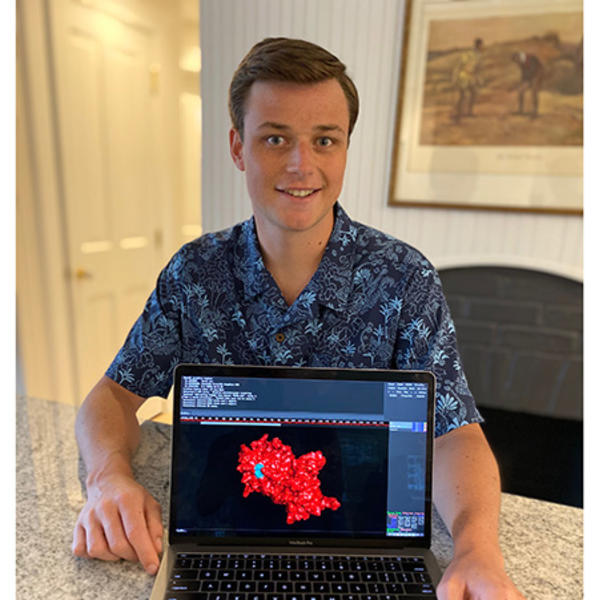Charlie Millard '22
Summer Plans: Research Associate Hometown: Southport, CT Major: Biology
Summer Plans
In the "Sheehy Lab," we research a cellular innate system of defense against HIV infection, specifically the role of a human protein called APOBEC3G in decreasing viral replication. APOBEC3G can mutate HIV to the point at which the virus is incapable of effectively replicating. In a classic example of an evolutionary arms race, HIV has evolved to counteract the antiviral effect of APOBEC3G. However, exploring ways to liberate APOBEC3G from viral regulation could provide novel therapeutic options. Our research is currently focused on an unusually potent form of APOBEC3G protein which has more significant antiviral activity. This summer we have sought to determine why this version of APOBEC3G has increased antiviral power in the hope that the insights we gain can be applied in the design of new HIV treatments that would harness an existing innate defense.
Lessons Learned
Although this online experience has been highly unconventional, it has provided me with unforeseen opportunities to expand my research skill set. Protein function is determined by protein structure, meaning we can use computer modeling techniques to predict how the changes we have made to the APOBEC3G protein might be increasing its ability to suppress viral infection. I have modeled the structure and have noticed some changes, but I am now learning to simulate the dynamics of the protein, which we think may help explain the results that we have seen experimentally. Before this summer, I had no background modeling proteins, let alone predicting how they move, and as a result of my expanded skillset, I am a better scientist and a stronger candidate for future internships and graduate school opportunities. In addition to my experience modeling proteins, I have spent far more time reading primary scientific literature and familiarizing myself with the conventions of the field than I would during a normal hands-on research experience. This opportunity to focus on research papers has given me a better feel for how to develop scientific questions and design experiments that will provide valuable answers. I look forward to utilizing the results of this research in our future work and hope it ultimately leads to a published article.
The Holy Cross Difference
The liberal arts education I am receiving at Holy Cross and my close relationship with Prof. Ann Sheehy have been integral to my development as a research scientist. The broad liberal arts education has helped cultivate my critical thinking ability and writing proficiency—crucial skills for a research scientist. In all of my classes at Holy Cross, I have been forced to draw my own conclusions and defend my positions with arguments based upon evidence. This method of building an argument and supporting it with research is crucial to the creation of scientific papers. In addition to the advancement of my critical thinking skills, the small size of Holy Cross has allowed me to form strong bonds with faculty members, especially Prof. Sheehy, who was my introductory biology professor freshman year. Prof. Sheehy’s openness and the small class size gave me the confidence to ask what her lab researched and if I could get involved with her work. Luckily, she said yes, and, as a result, I have had the opportunity to develop a strong bond with Prof. Sheehy, gain valuable research experience, and greatly accelerate my development as a scientist.
What's Next
I’ve known since high school that I want to pursue a career in molecular biology and biological engineering, but this opportunity has strengthened my convictions, while also steering me to the specific subfield of biology I hope to pursue. Working with Prof. Sheehy on a daily basis, performing extensive reviews of scientific literature, and working with computer models of the APOBEC3G protein has deepened my knowledge of and interest in immunology and more specifically immunoengineering, which seeks to harness the body’s defenses and tailor them to new purposes, such as the treatment of diseases like cancer or more efficient methods for healing wounds. My work with Prof. Sheehy this summer has allowed me to become proficient in the modeling of proteins, an extremely valuable skill as an immunoengineer, and I hope to one day use the skills I have cultivated this summer in the design of proteins that may help slow the biological aging process. This unique, online experience has allowed me to expand and strengthen my skill set, and my newly acquired expertise should help me pursue my career goals in the field of immunology.
Click to read more student summer profiles: Paulina Martin '21, Ramses Taveras '22, and Elizabeth Larkin '21.


